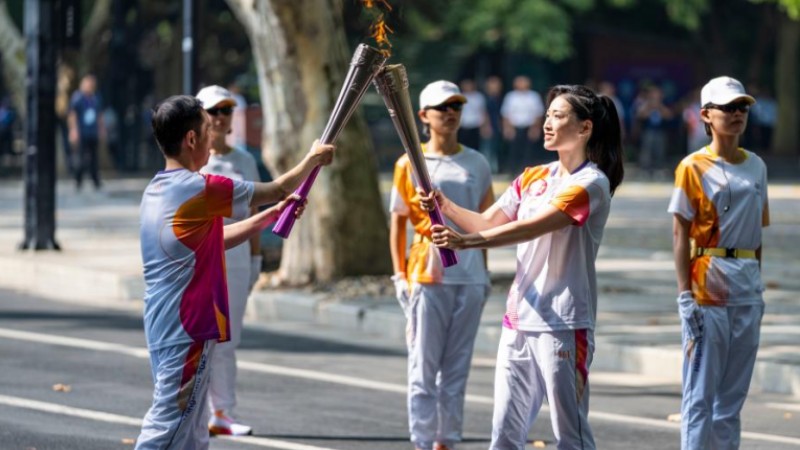Chinese ethnic minority entrepreneurs help boost investments and development on the frontiers

Photo taken on April 17, 2023 shows people wandering in Napa Lake Wetland in Shangri-La, Deqen Tibetan Autonomous Prefecture, southwest China's Yunnan Province. (Photo/ People’s Daily Online)
A few decades ago, a handsome Tibetan-Chinese bus driver named Qinwang Renzeng was driving down his daily route in the picturesque town of Shangri-La in China’s southern Yunnan province. As fate would have it, Qinwang was flagged down by a young Han-Chinese woman who needed a ride. The young woman, Wang Chaoying, traveled thousands of kilometers to Shangri-La from her hometown of Taizhou, part of the coastal province of Zhejiang. It was love at first sight. The pair soon got married and eventually moved back together to Wang’s hometown in Zhejiang, where their lives changed forever.
In 2005, Qinwang and his wife cofounded Zhejiang Runlab Technology, a company specializing in manufacturing laboratory equipment for clinical research and other specialty markets. To Qinwang, running a startup in a highly specialized field in an unfamiliar city seemed all but an impossible task.
As a new comer and an ethnic minority, Qinwang was surprised to find a welcoming home in Taizhou City, whose own diverse community quickly embraced this young Tibetan Chinese entrepreneur as one of their own.

Qinwang Renzeng (R) and his wife Wang Chaoying inspect product quality at Zhejiang Runlab Technology Co., Ltd.,in Taizhou city, eastern China's Zhejiang Province. (Photo provided to People’s Daily Online)
“When I first arrived in Taizhou, I had no real skills other than knowing how to drive a car,” joked Qinwang, “but the outpouring of support from the local community, especially the public-funded support organizations encouraged me to take on the impossible.”
China’s official supporting system for ethnic minority groups have played a critical role in providing a support network for millions just like Qinwang. In Qinwang’s case, the system proactively connected him to the various organizations including Department of Ethnic and Religious Affairs and Federation of Industry and Commerce in Taizhou, helping to expand his social and business networks rapidly.
Support programs for minority entrepreneurs like Qinwang did not stop at network expansion. Taizhou municipal government also regularly brought in resident business and industry experts who offered critical insights that helped Qinwang’s company successfully navigate economic challenges as far back as the 2008 financial crisis and as recent as the COVID pandemic.
“At the beginning, my goal was to simply support my family. I soon realized that I owe much of my success to the local community and various support programs that brought my company where it is today. I now feel an unmistakable responsibility to uplift other aspiring ethnic minority entrepreneurs,” Qinwang said.
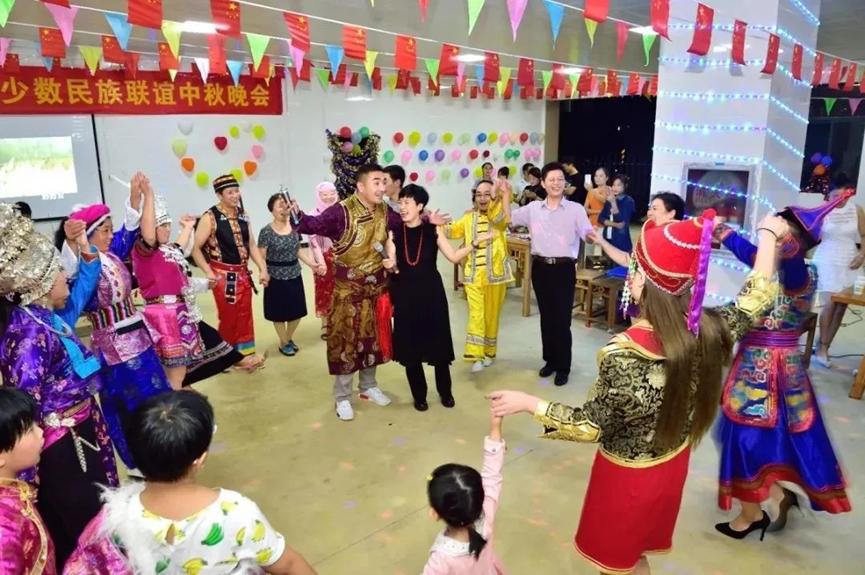
Qinwang Renzeng joins the Mid-Autumn Festival celebration for ethnic minorities in Taizhou, eastern China’s Zhejiang Province. (Photo Provided to People’s Daily Online)
Through the years, Qinwang sponsored a series of entrepreneurial exchange activities between his hometown of Shangri-La and Taizhou City to promote the exchange of business ideas and expertise. Qinwang further champions education as the single most critical factor to economic empowerment of ethnic minorities, having sponsored many local students from his hometown over the years.
“The most effective tool to uplift people from poverty is education”, Qinwang said, “that is why I promised my friends and family in Shangri-La that any ethnic minority child from my hometown who wants an education will receive my full financial support.”
Qinwang’s commitment to uplifting others extends beyond his own ethnic group. He has mentored and invested in a diverse group of ethnic minority-run businesses ranging from Hui cuisine restaurants to Mongolian-owned beauty salons. Qinwang’s actions helped foster a genuine sense of belonging and harmony across all ethnic groups in his local community.
“As an ethnic minority, I have been a beneficiary of many supportive public policies aimed at promoting economic progress for people like myself. It is now my duty to spread the word to all ethnic groups. Through harmony, we can achieve unity,” Qinwang said.
In any country with a heterogenous population, ethnic, religious, and cultural differences can sometimes be a divisive social force and lead to problems at a national scale. China, however, tried to find her own path to establish a strong national identity that celebrates these differences while promoting harmony and unity. This commitment at a national level has not only preserved the cultural heritage of ethnic minority groups, but has also empowered millions of ethnic minorities like Qinwang to thrive within the enormous national market and participate in the country’s fast growth.
Remarkably, Qinwang’s story of supporting other ethnic minority-founded businesses finds itself in good company as an increasing number of successful ethnic minority entrepreneurs take it upon themselves to “pay it forward” and help other minority groups pursue their own life endeavors. Qinwang's support has taken various forms. He has provided financial assistance to two struggling businesses in Shangri-La, offering crucial support during their most challenging times. Moreover, he sponsored the education of 17 students from Yunnan, enabling them to access educational opportunities that might have been otherwise unattainable.
His aid has not been limited to his own ethnic community but has embraced a diverse spectrum of minority groups. Taking proactive steps, he allocated funds to assist fellow ethnic compatriots in their entrepreneurial endeavors. To date, he has assisted four minority entrepreneurs, ranging from the establishment of Hui cuisine restaurants to backing a Mongolian beauty salon. Qinwang's dedication to fostering unity and economic prosperity through practical support exemplifies his commitment to a harmonious and inclusive society.
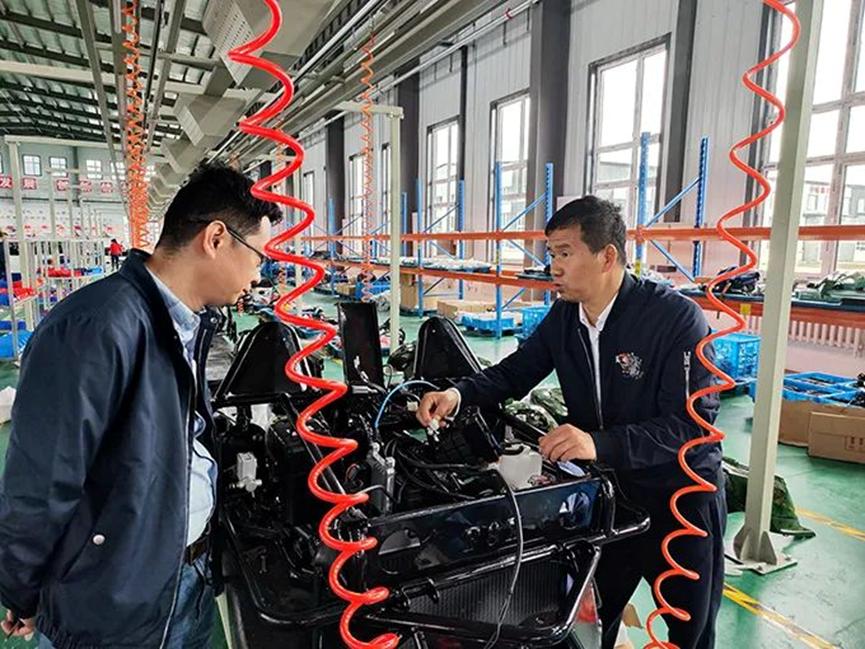
Fu Chunsheng provides hands-on guidance in the workshop during motorcycle production. (Photo provided to People’s Daily Online)
Fu Chunsheng, an entrepreneur of Hezhe ethnicity, shares a similar story. The Hezhe people, whose current population stands at approximately 5000, are descendants of the Tungusic people of East Asia who have traditionally lived along Heilongjiang, Songhuajiang, and Wusuli River in northeastern China. Fu left his birthplace of Tongjiang at a young age to pursue his education in Zhejiang province in southern China. After graduating and building a successful business in the affluent Zhejiang province, Fu made it his mission to provide economic opportunities for the various ethnic groups living in his hometown of Tongjiang in the Heilongjiang province in northeastern China.
Fifteen years ago, Fu returned from abroad to start his own business. Driven by his passion for automobiles, Fu established factories in Zhejiang and Chongqing to manufacture automotive engines for international clients. Propelled by growing customer demand and supported by favorable national and local policies, Fu’s company expanded quickly to cover the complete value chain of R&D, production, and sales of motorcycles.
Despite his financial success, Fu never forgot his hometown and the ethnic minority groups living there. In 2022, inspired by his attendance at the "Private Enterprises Investing in Border Areas" conference, a joint effort by the State Ethnic Affairs Commission and the China Federation of Industry and Commerce to promote private sector involvement in the development of China's border regions, Fu made the decision to establish a company in his hometown. Despite early challenges including low operational efficiency and labor shortage, Fu kept on like a man on a mission.
“Someone has to be the first to do the difficult thing,” Fu said. “I come from the Hezhe ethnic group, and there is hardly anyone from our community involved in business. I wish to give back to my hometown by encouraging aspiring ethnic minority entrepreneurs like me to start their own business.”
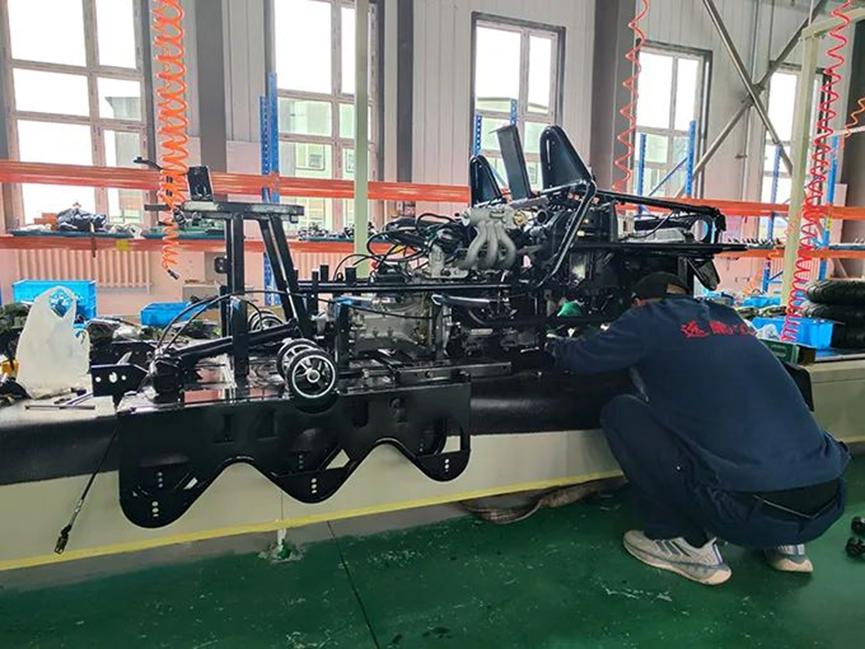
A worker in Tongjiang factory engaged in assembly line production. (Photo provided to People’s Daily Online)
Currently, Fu’s Tongjiang factory has become operational and created nearly a hundred jobs for skilled local workers from six distinctive ethnic groups including Han, Manchu, Hezhe, and others.
“I could choose to exclusively hire ethnically Hezhe workers, but I believe we can only achieve harmony and common prosperity when we all feel uplifted,” Fu said.
Reflecting on his time living abroad, where he witnessed social issues caused by ethnic and cultural division, Fu says that “China has excelled in achieving ethnic harmony. China’s ethnic minorities exhibit a unique sense of cohesion, built around a shared history, and bolstered by inclusive and supportive public policies. As a minority entrepreneur, I have enjoyed the benefits of our country’s ethnic harmony and unity, and therefore I bear a responsibility to give back and promote the common prosperity for all ethnic groups.”
Qinwang and Fu are living testimonials of China’s commitment to uplift all ethnic minorities and its key to success lies in economic development and common prosperity. A recent study revealed that out of the 832 impoverished local counties targeted by the anti-poverty campaign, 420 belonged to autonomous regions where ethnic minority groups largely reside. In China, there are countless ethnic minority individuals like Qinwang and Fu who have built a great life for their own families while also uplifting the lives of others at the same time.
As China continues its path of economic development, these ethnic minority entrepreneurs stand as a beacon for others, demonstrating that, despite the cultural differences, ethnic minorities can freely claim a common national identity and enjoy equal access to economic opportunities, and in doing so, they can realize their own life goals while bringing prosperity to their ethnic and local communities.
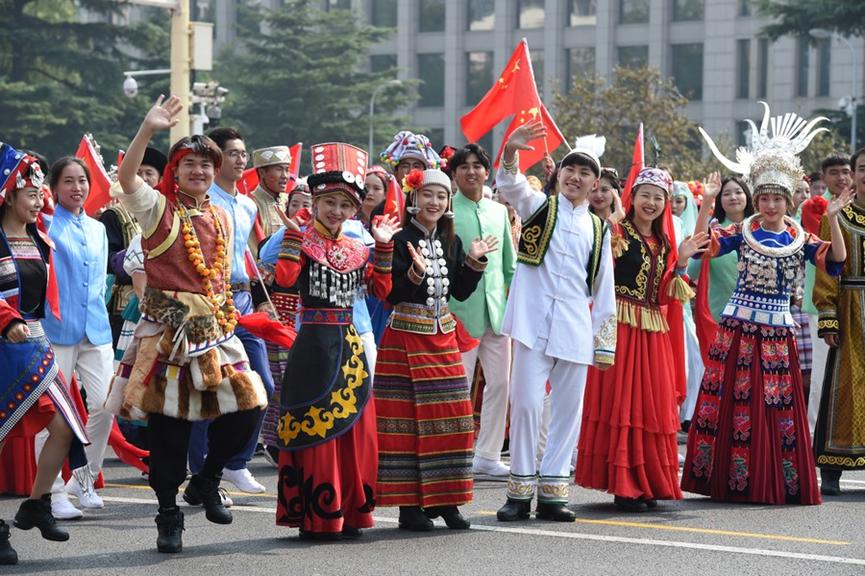
A formation featuring ethnic unity takes part in a mass pageantry celebrating the 70th founding anniversary of the People's Republic of China (PRC) in Beijing, capital of China, Oct. 1, 2019. (Xinhua/Fan Peishen)
Photos
Related Stories
- Ethnic clothing festival held in Kunming, SW China's Yunnan
- China’s development in ethnic unity in past decade
- Interplay between traditional and modern enriches lives of China's ethnic minorities
- Ethnic costume show held in Nanning, S China
- China's top political advisor urges efforts to better tell stories of ethnic exchanges
Copyright © 2023 People's Daily Online. All Rights Reserved.






